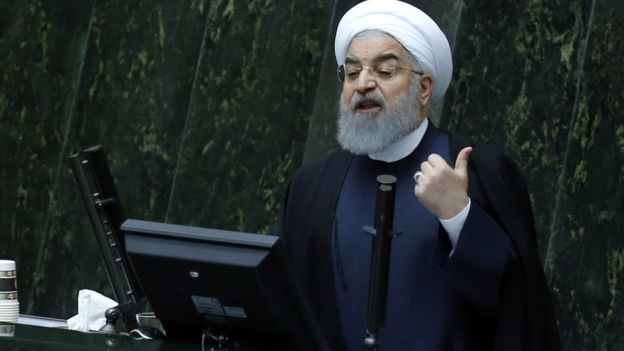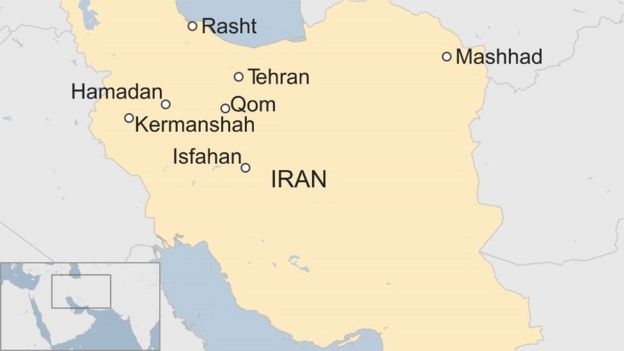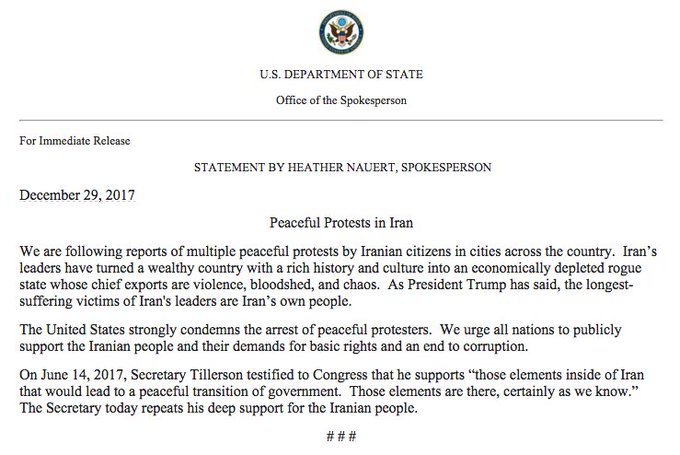The Iranian government has told people to avoid "illegal gatherings" in the wake of two days of angry anti-establishment protests in the country.
Scores have been arrested in protests over corruption and living standards.
Some small groups have continued demonstrations in Tehran and elsewhere.
But Interior Minister Abdolrahman Rahmani Fazli urged people "not to participate in these illegal gatherings as they will create problems for themselves and other citizens".
The Iranian authorities are blaming anti-revolutionaries and agents of foreign powers for the outbreak of anti-establishment protest.
In the US, the Trump administration warned Iran overnight that the world was watching its response.
Meanwhile, thousands of pro-government demonstrators attended rallies on Saturday.
These official rallies were organised in advance of the anti-government protests, to mark the eighth anniversary of the suppression of major street protests.
'Authorities taken aback'
By BBC Persian correspondent Kasra Naji
In videos on social media, demonstrators are seen shouting slogans demanding Iran's supreme leader and the clerical regime go.
The third day of protests took place only a few kilometres from where thousands have gathered for a pro-government rally in support of the supreme leader. The authorities hope these government-sponsored demonstrations will be a show of force.
The state-run television - a bastion of the Islamic hardliners in Iran - is reporting a massive turnout, focusing on the demonstrators' support for the supreme leader.
The authorities are taken aback by the spread of anti-government protests which they say are illegal and will be dealt with harshly. But they admit there is widespread discontent in the country, and not just about rising prices.
How did the anti-government demonstrations start?
The protests started in the north-eastern city of Mashhad - the country's second most-populous - on Thursday.
People there took to the streets to express anger at the government over high prices, and vented their fury against President Hassan Rouhani. Fifty-two people were arrested for chanting "harsh slogans".
The protests spread to at least half a dozen cities on Friday. In some cities police in riot gear and on motorbikes clashed with demonstrators.
Some protests developed into broader demonstrations against the authorities, calling for the release of political prisoners and an end to police beatings. It was the biggest display of public dissent since huge pro-reform rallies in 2009.
Overall, the numbers said to be taking part range from less than 100 in some places to thousands in others - but demonstrations do not appear to be taking place on a massive scale.
Some reports suggest that calls for further protests on Saturday have already been heeded.
What is Iran saying about the protests?
First Vice-President Eshaq Jahangiri has suggested that government opponents are behind the protests, according to comments reported by state broadcaster IRIB.
He said: "Some incidents in the country these days are on the pretext of economic problems, but it seems there is something else behind them. They think by doing this they harm the government, but it will be others who ride the wave."
The governor-general of Tehran said that any such gatherings would be firmly dealt with by the police, who are out in force on the main roads.
Officials in Mashhad said the protest was organised by "counter-revolutionary elements", and video online showed police using water cannon.
 |
| President Hassan Rouhani is blamed by many for the poor state of the economy |
What was the US response?
"The Iranian government should respect their people's rights, including their right to express themselves. The world is watching," White House spokeswoman Sarah Huckabee Sanders said on Twitter.
The same tweet later appeared on President Donald Trump's Twitter account.
The US State Department urged all nations "to publicly support the Iranian people and their demands for basic rights and an end to corruption".
What is behind the unrest?
The protests were initially against economic conditions and corruption but appear to have turned political.
Slogans have been chanted against not just Mr Rouhani but Supreme Leader Ayatollah Ali Khamenei, and clerical rule in general.
Demonstrators were reportedly heard yelling slogans like "The people are begging, the clerics act like God". Protests have even been held in Qom, a holy city home to powerful clerics.
There is also anger at Iran's interventions abroad. In Mashhad, some chanted "not Gaza, not Lebanon, my life for Iran", a reference to what protesters say is the administration's focus on foreign rather than domestic issues.
Other demonstrators chanted "leave Syria, think about us" in videos posted online. Iran is a key provider of military support to the government of Bashar al-Assad in Syria.
It is also accused of providing arms to Houthi rebels fighting a Saudi-led coalition in Yemen, which it denies, and is an ally of Lebanon's powerful Shia movement Hezbollah.
 |
| Protests took place in at least half a dozen cities |
Source: BBCNews




No comments:
Post a Comment
Add a Comment...